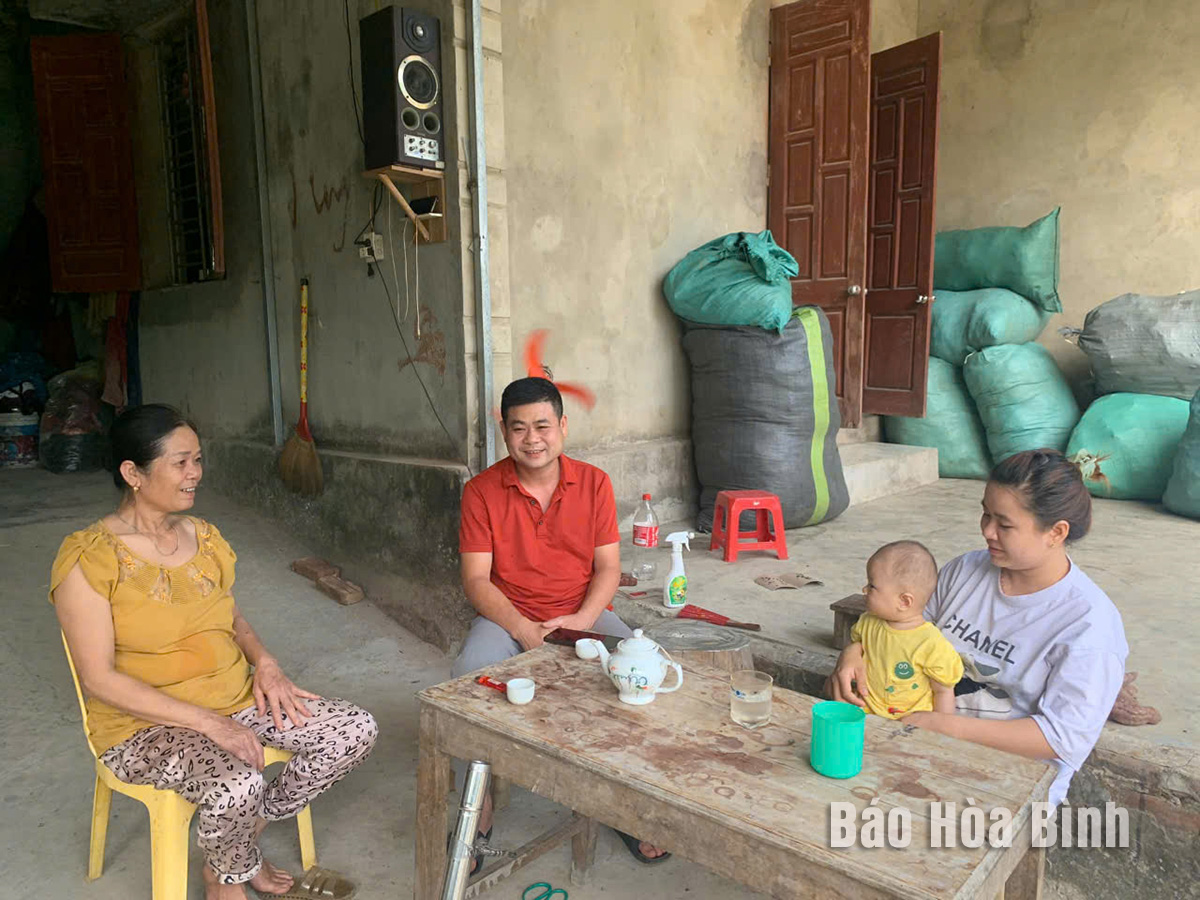
In recent years, the People's Committee of Lac Thuy district has directed units and mass organisations to promote the popularisation of the Party's policies and resolutions and the State's laws, as well as issued guiding documents on local religious affairs.
The Secretary of the Party cell in Dong
Danh village, Phu Thanh commune (Lac Thuy district), meets local parishioners
to disseminate policies and laws on belief and religion.
Through reviewing the situation of religious
activities, authorities found no organisations called "Hoi thanh Duc Chua Troi
Me” (World Mission Society Church of God) operating in the district. However,
in Yen Bong commune, there are two citizens participating in this organisation
through the Zoom application following the link of the Youtube channel
"Hoi Thanh cua Duc Chua Troi" on every Tuesday and Saturday. The
Party Committee and People's Committee of Yen Bong commune have directed local
police, departments, and sectors to persuade these two citizens not to
participate in the organisation in any form.
Statistics show that there are 72 places of
worship, including temples, communal houses, and shrines across Lac Thuy.
Belief practices primarily follow folk beliefs, adhering to the customs,
traditions, and ethics of the nation. There are two religions in the district,
Buddhism and Catholicism, with over 15,000 followers who live in all the 10
communal-level localities of Lac Thuy.
Religious organisations have seriously complied
with legal regulations, conducting religious activities in accordance with
their charters and principles. There are no superstitious practices, abuse of
spiritual beliefs at places of worship, or abuse of religions to incite
gatherings that disrupt public order.
Religious dignitaries and followers have
properly adhered to the Party's policies and the State’s laws. They have also
actively encouraged their fellows to lead "a good secular and religious
life", enthusiastically worked, engaged in humanitarian and charitable
activities in the community, contributed to socio-economic development, and
helped maintain public order and social safety in the locality.
Besides, all-level administrations have always
facilitated activities of religious organisations and practitioners in
accordance with the law, ensuring the people's freedom of belief and religion.
Vice Chairman of the Lac Thuy People's Committee
Nguyen Ngoc Van stated the district always pays attention to and creates
favourable conditions for religious organisations, dignitaries, and followers
to practice their beliefs and religions in line with legal regulations. It has
moved quickly to meet their legitimate demand related to belief and religion.
Local authorities have also organised meetings,
visited and presented gifts to belief and religious establishments on the
occasion of the Lunar New Year (Tet) as well as important festivals. In
addition, they have promptly updated locals about the Party and State's
guidelines and policies regarding religious and belief affairs, he added.
The Standing Board of the Hoa Binh provincial Party Committee has agreed in principle on a proposal by the Standing Board of the Party Committee of Hoa Binh city to gather feedback on the city’s 1:2000 zoning plan, which forms part of its broader urban development strategy.
Hoa Binh province has made notable progress in public administration reform and digital government development, with the satisfaction index among citizens and businesses reaching over 84%, according to recent government evaluations.
Thanks to great efforts by local authorities in recent times, the governance and public administration performance of Mai Chau district has been significantly improved.
In the afternoon of June 6, the Party Committee, the People's Council, the People's Committee and the Fatherland Front of Lac Son district solemnly held a meeting to celebrate the 139th anniversary of the district's founding (1886–2025) and the 79th anniversary of the establishment of the district's Party Committee (1946–2025). There was the attendance of Mr. Bui Van Thang, the Vice Chairman of the Provincial People's Council; Mr. Quach Tat Liem, the Vice Chairman of the Provincial People's Committee; Ms. Dang Bich Ngoc, the Deputy Head of the National Assembly Delegation of the province; as well as the former leaders of the province and district through various periods, who are the natives of the district.
Implementing the Politburo’s Resolution No. 57-NQ/TW on breakthroughs in science – technology, innovation, and digital transformation is a golden opportunity for the northern mountainous province of Hoa Binh to renew growth model, improve competitive edge and shorten digital gap.
Resolution 57-NQ/TW, issued by the Politburo on December 22, 2024, identifies sci-tech, innovation, and digital transformation as strategic breakthroughs to build a developed and prosperous nation. In Hoa Binh province, this spirit is not just a slogan, it’s being put into action through concrete initiatives that form a "new development triangle”: digital citizenship, digital economy, and digital administration.



